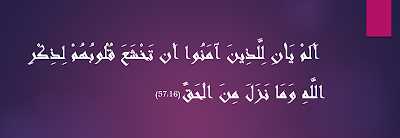بِسْمِ اللّهِ الرَّحْمـَنِ الرَّحِيمِ
Al-Hadid (Iron) - Is it not time that the hearts of all who have attained to faith should feel humble at the remembrance of God and of all the truth that has been bestowed [on them] from on high, 57:16
This is a second blog post about the same transformative ayat, Al-Hadid 57:16, of the Qur'an, which was mentioned in the blog post "The time to change is Now"
Ismail Haqqi (Hakki) Bursevi, a renowned Turkish scholar and mystic, writes in his tafsir Rūḥ al-bayān, one of the most prominent mystical interpretations of the Quran, about the transformative power of this verse. He references the stories of Abdullah bin Mubarak and Malik bin Dinar, illustrating how this verse profoundly impacted their lives.
Abd Allah ibn al-Mubarak (may Allah have mercy on him) once said:
"One day, when I was young, I was in an orchard with my companions. We ate and drank, and as I was fond of playing the lute, I picked it up at night to play. But suddenly, the lute spoke to me and recited: ‘Has the time not come for those who believe that their hearts should become humble for the remembrance of Allah?’ (Quran 57:16). In that moment, I struck the lute against the ground, breaking it, and abandoned all distractions that diverted me from Allah."
Similarly, it is narrated that Malik ibn Dinar (may Allah have mercy on him) was once asked about the reason for his repentance. He recounted:
"I was a policeman, deeply immersed in drinking alcohol. Then, I purchased a beautiful slave girl, and she became very dear to me. Over time, she bore me a daughter, whom I loved dearly. As she grew older and began to walk, my love for her only deepened. She became attached to me, and I to her. Whenever I would place a goblet of wine before me, she would come and knock it over, spilling it on my clothes.
When she turned two years old, she passed away. The grief over her death overwhelmed me.
Then, on the night of the 15th of Sha’ban, which was a Friday, I drank heavily and, in my drunken state, neglected to perform the Isha prayer. That night, I had a dream. It was as if the graves had opened, and people were being gathered for judgment. I was among them. Suddenly, I heard a terrifying sound behind me. When I turned around, I saw a massive serpent, the largest I had ever seen. It was dark blue and black, with its mouth wide open, rushing towards me at great speed.
Terrified, I ran. I passed by an old man, dressed in white and fragrant with a pleasant scent. I greeted him and pleaded, ‘Help me! Save me!’
The old man replied, ‘I am too weak to help you. This creature is far too strong for me. But run ahead—perhaps Allah will provide you with a means of escape.’
I fled, running in desperation, until I reached the edge of the Hereafter. I saw the fires of Hell before me, and I almost fell into them out of fear. But then, a voice called out, ‘Turn back! You are not among its people!’
Relieved, I turned back, only to find that the serpent was still in pursuit.
I ran back to the old man and said, ‘I begged you to help me, yet you did nothing!’
The old man wept and said, ‘I am too weak. But go to that mountain over there. It holds the trusts of the believers. If you have a deposit there, it will protect you.’
I looked towards the mountain and saw it was circular, full of windows, each covered with fine silk curtains. Every door and window had golden panels adorned with precious jewels. As I ran towards it, the serpent followed closely behind.
Then, an angel called out, ‘Lift the curtains! Open the doors! Look out, all of you! Perhaps this desperate man has something among you that can save him!’
At once, the doors opened, and radiant children with faces like full moons looked out. The serpent was drawing near, and I stood frozen in fear.
One of the children suddenly shouted, ‘All of you, hurry and help him!’
A group of them emerged, and among them, I saw my daughter. When she saw me, she wept and said, ‘By Allah, that is my father!’
She leaped from the group like an arrow and landed before me. She stretched out her left hand, grasping my right, and with her right hand, she warded off the serpent, which then fled.
She then seated me, climbed onto my lap, and lovingly stroked my beard. She said, ‘O my father, has the time not come for those who believe that their hearts should become humble for the remembrance of Allah?’ (Quran 57:16).
I wept and asked, ‘My dear child, do you know the Quran?’
She replied, ‘O father, we know it better than you do.’
I asked her, ‘Tell me about that serpent that was chasing me.’
She said, ‘That was your evil deeds, which you nourished with your sins until it became so strong that it was about to throw you into Hell.’
I asked, ‘And the old man I met on the way—who was he?’
She replied, ‘That was your good deeds. You had weakened them so much that they could no longer help you.’
I asked, ‘And what is this mountain?’
She replied, ‘These are the children of the believers, who have passed away in their innocence. We dwell here until the Day of Judgment, waiting for you to join us, so we may intercede for you.’
At that moment, I awoke, terrified. When morning came, I abandoned my past way of life, repented to Allah, and this is how I returned to Him.’"






